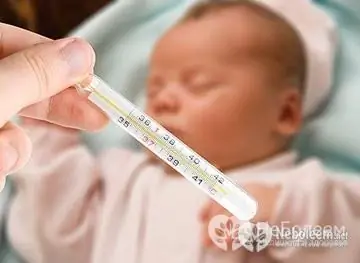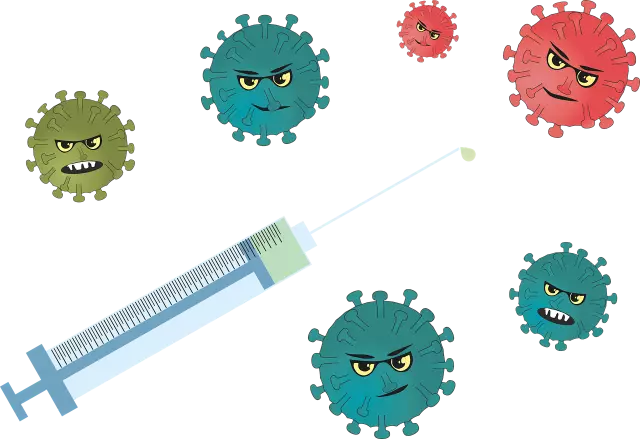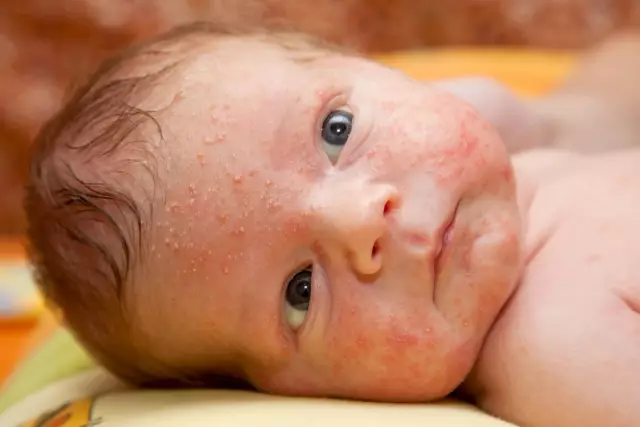- Author Rachel Wainwright wainwright@abchealthonline.com.
- Public 2023-12-15 07:39.
- Last modified 2025-11-02 20:14.
Influenza in a newborn

Influenza is an acute viral illness that usually occurs between November and March. The infection mainly affects the upper respiratory tract and is accompanied by severe intoxication. Influenza in newborns sometimes provokes complications in the form of acute otitis media, pneumonia, damage to the cardiovascular and nervous systems.
Influenza in young children
The flu is extremely contagious. The disease spreads rapidly and in some cases reaches epidemic proportions. At first, adults mainly fall ill, then cases of influenza begin to be recorded among children. Influenza in young children sometimes forces groups in kindergartens, nurseries, and school classes to be quarantined.
Epidemics are associated with the fact that in winter people spend a long time indoors, communicate in large groups, and receive few vitamins from food. In winter, viruses spread especially quickly, since cold weather and short daylight hours contribute to their active reproduction.
Influenza affects children of all ages. Most often, the disease is recorded after 2-3 years of age. Influenza in newborns is somewhat less common, although during epidemics such situations are quite possible.
Influenza in the first month of life
The neonatal period is four weeks after birth. This time is a difficult test for the infant, as the child adapts to independent existence outside the mother's body. Influenza in a newborn is possible in two ways, depending on whether the infection occurred before or after birth.
Congenital flu occurs in those children whose mothers became ill shortly before giving birth. The child is born weakened, he has low-grade fever, swelling of the nasopharyngeal mucosa. Such children are lethargic, eat poorly, and are prone to breathing problems. Influenza in a congenital neonate is often complicated by a bacterial infection that leads to pneumonia. A severe course of the disease requires hospitalization in the intensive care unit for infants.
Influenza in a newborn can also occur if it becomes infected after birth. In this case, the baby is born healthy, but later becomes infected with the flu from others. The signs of the disease are increasing gradually. In the first days, the temperature rises slightly, but the child loses his appetite, becomes lethargic, sleepy. Moderate catarrhal phenomena are manifested in the form of a small runny nose, swelling of the nasopharynx, cough. The baby's breathing changes. The kid sniffs, tries to breathe through his mouth.
Prevention and treatment of influenza in newborns
Influenza in a newborn occurs after direct contact with sick adults or other children. To avoid infection, it is necessary to protect the child from excessive communication. Similar measures are reflected in the folk tradition: you can not show a baby up to a month to anyone except the closest family members.
If someone close to the baby is sick, then the child should be isolated within the apartment. Ventilate the room more often, do wet cleaning, and wear medical masks.
Prevention of influenza in newborns is also possible with the help of medicines. Use human interferon preparations at the correct dose as recommended by your pediatrician. It is most convenient to choose drops or rectal suppositories.
The main prevention of influenza in young children is breast milk. Even if the mother herself is sick, then she should not stop breastfeeding. With human milk, the baby receives the protection of maternal immunity.
In general, the flu in a newborn is fairly easy if the baby is born on time and is breastfed. Often, the baby does not even get sick, although other family members have the flu.
If the child is sick, then you need to seek medical help.

Call a doctor immediately if your body temperature is over 38 degrees. Influenza in newborns is treated with antiviral drugs, antipyretics. In some cases, hospitalization is required.
Flu in a one-year-old child
One-year-old children get the flu more often than newborns. The disease is always acute. The temperature rises above 38.5 degrees, chills, coughing, severe weakness, appetite disappear. The flu in a one-year-old child lasts about 5-7 days. The baby needs to be provided with bed rest, be given plenty of drink and light food. If the temperature is high, give your child antipyretic medications and call the doctor at home.
Influenza in young children requires special attention and treatment. Follow medical advice strictly. This is what will help to avoid serious complications and to recover favorably from the disease.
Found a mistake in the text? Select it and press Ctrl + Enter.






